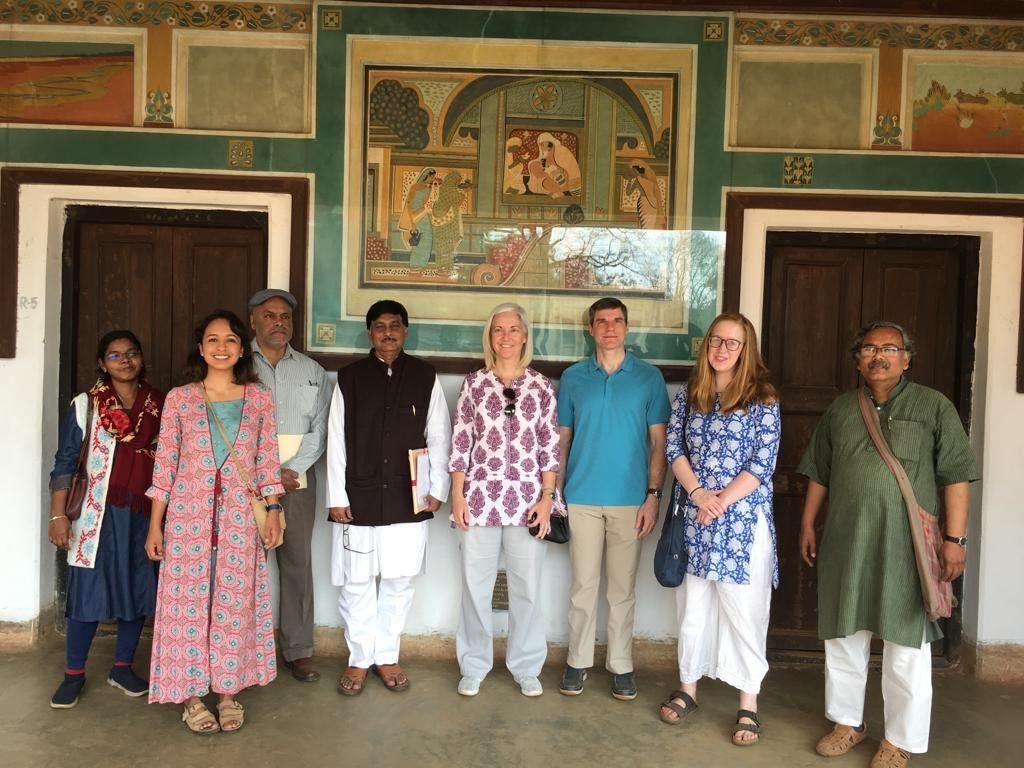Strengthening Women’s Entrepreneurship By Ranjita Biswas A collaborative project between Claflin University, South Carolina, and Visva-Bharati University, West Bengal, aims to enhance the management skills of women entrepreneurs running small businesses. India has many family-based enterprises anchored by women. Their products are sometimes sold in farmers’ markets and handicraft fairs or offered to middlemen who supply them to bigger operators. These women usually lack expertise in marketing strategies and do not receive guidance on how to improve their products.
A partnership project between Claflin University, South Carolina, and Visva-Bharati University, West Bengal, aims to change this scenario. The one-year project focuses on conducting collaborative research, providing training and promoting entrepreneurship to enhance the business and management skills of women running small businesses. It is part of Partnership 2020, which is funded by the U.S. Department of State and the U.S. Embassy New Delhi, implemented in collaboration with the University of Nebraska Omaha, with the Washington, D.C.-based Center for Strategic and International Studies playing an advisory role. Partnership 2020 supports U.S.-India collaborative research and aims to create tangible economic development as well as strong university partnerships. Both Claflin University and Visva-Bharati University are located in small cities, with largely rural surrounding areas. Claflin University is located in the city of Orangeburg in South Carolina. The land area of the city is 21.4 square kilometers, and the population was 12,903 according to the 2018 census. A historically black university founded in 1869, more than half of Claflin’s student population comprises women. Similarly, at Visva-Bharati University, women students currently outnumber male students. The university was founded in 1921 by Nobel laureate Rabindranath Tagore in Santiniketan, a neighborhood in Bolpur city of West Bengal’s Birbhum district. In 1951, Visva-Bharati became a central university and was declared an institution of national importance by the Indian parliament. The impetus for the Partnership 2020 project comes from the findings of an earlier project of Claflin University, in partnership with the University of Calcutta, titled Promoting Eco-friendly Entrepreneurship Development Among Women in West Bengal, India, under the U.S.-India 21st Century Knowledge Initiative. The staff of the project, which ran from 2015 to 2019, realized that, in most cases, women’s home-based small businesses needed the assistance of members of their extended families. Thus, the current project has also chalked out a training program for family members who do
not have much formal education. One of its immediate objectives is to make tangible impacts on job creation and entrepreneurship in both countries. “After the training programs are tested and finalized, we will select two groups of women for two pilot projects,” says Harpal S. Grewal, professor of economics and finance at Claflin University and co-principal investigator of the project. “Each group will be provided training, using one of the two programs. They will be provided support services, technical assistance and financial resources. The results of these projects will be used to build comprehensive business development programs.” To that end, a website will be developed for online classes, which will also provide information and resources for small and micro businesses. The project’s timeline includes establishing a consortium for entrepreneurship development for women from low-income families in West Bengal, as well as hosting a conference. Grewal states that the project’s “innovative methods will be focused on cost effectiveness, utilizing the family as a decision-making unit, environmental sustainability and global markets.” The project is also exploring the possibility of establishing training programs for small family-based businesses owned by women in Orangeburg, Bamberg, Calhoun, Barnwell and Hampton counties in South Carolina. The counties “where we will replicate these training programs are in rural and relatively low-income population areas,” says Grewal. “We will also modify these programs to fit the needs of the target groups.” On the Indian side, the program is led by Amit Hazra, professor and head of the Department of Lifelong Learning and Extension, Institute of Rural Reconstruction, at Visva-Bharati University. He is in the process of selecting areas where training and marketing strategies could help indigenous small businesses. This includes businesses dealing with handicrafts typical to the Santiniketan area, like quilted kantha stitch-work textiles, lacquer-based crafts, copper wire work, bamboo crafts, pottery and ceramics, which have a huge demand in the international market.
The other areas which could be explored are micro businesses like beauty parlor-based activities, garland and flower bouquet making, tailoring and making of home-based food products like jams, pickles, etc. These are activities which can be taken up by the women after taking care of regular household chores. The project is also expected to contribute to the expansion of academic research on entrepreneurship among faculty and students in both the institutions. “We are especially excited about the potential for local public and private economic development,” says Grewal in an article published on the Claflin University website. “This project is an opportunity for community-based organizations to develop family-based capacity building and training programs for women-owned small and micro enterprises.” Ranjita Biswas is a Kolkata-based journalist. She also translates fiction and writes short stories.

